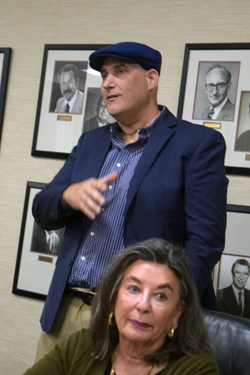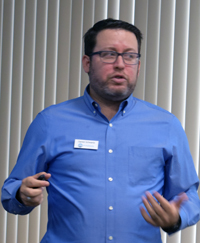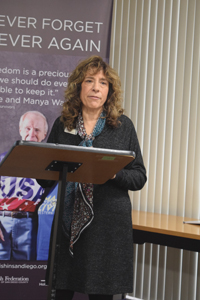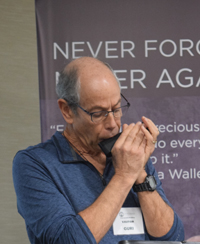
Other items in this column include:
*Association of Jewish Studies holds convention in San Diego Dec. 15-17
*Jewish Family Service will counsel college students on immigration status
*A Shonda
* Political bytes
* Coming our way
* In Memoriam


SAN DIEGO – True to its roots, when it was founded in 1936 to help European Jews who were being persecuted by the Nazi regime in Germany, the Jewish Federation of San Diego County on Tuesday, Dec. 3, launched a community-wide coalition to come to the aid and honor an estimated 500 Holocaust survivors who live in the county today.
Eighty-three years ago, when the then future U.S. District Court Judge Jacob Weinberger was the founding president of the United Jewish Fund, as the Federation was known then, the Holocaust was still in its initial, pre-Kristallnacht stages. Now, as the number of Survivors of the Holocaust diminishes on a daily basis, that ugly chapter in history is nearing its sad conclusion.
In a meeting attended by representatives of a diverse array of Jewish agencies, synagogues, and organizations, Michael Jeser, the Federation’s president and CEO, set the tone, declaring “We want a collective effort. Care of survivors is all of our responsibility.”
Darren Schwartz, the Federation’s chief program officer, said if local statistics mirror the national picture, approximately one-third of the survivors in this region live in poverty. That means that they need dental and medical care, transportation, home care, and an end to their isolation.

 While people assume that the number of survivors who need help is fast diminishing, the opposite may be true, Schwartz said. Some people, who have tried to bury the Holocaust deep in their memories, may when beset by old age, frailty, reduced family support, and isolation, step forward in the next several years to ask for support.
While people assume that the number of survivors who need help is fast diminishing, the opposite may be true, Schwartz said. Some people, who have tried to bury the Holocaust deep in their memories, may when beset by old age, frailty, reduced family support, and isolation, step forward in the next several years to ask for support.
Of the estimated 500 survivors in the county, approximately 150 are being helped through such agencies as Jewish Family Service, Seacrest Village, and the Coastal Roots Farm, Schwartz said. Overlapping to some extent with that group are 130 Survivors who are active in such organizations as the New Life Club, the Butterfly Project, Anti-Defamation League, and the Community Yom HaShoah observance.
There may be others who are receiving services from non-Jewish social service agencies, and some who are totally isolated, impoverished, and living in dire conditions.
Denise Selati told of a Survivor she called “Sara” who is in her mid-80s. “Sara” was born in Leipzig, Germany, immigrated to Buenos Aires, Argentina, and eventually came to San Diego with her husband. After her husband died, Selati reported, the woman’s life fell apart. Her annual income is $11,000. She lives in squalor. She is diabetic. She has no teeth. She has little food. She tries to make a head of cabbage last for her meals for three days. She is unable to shower herself. She has no friends. Her son lives in another state and has no contact with her.
“We need to look after our own; we all have a role to play,” Selati declared.

Hedy Dalin, director of care management at Jewish Family Service, said that although some Survivors might be eligible for payments from the Claims Conference that doles out reparations to Holocaust Survivors, many do not want to deal with the German government, nor to fill out the intrusive forms that are required of them to qualify for the grants. She added that many Survivors are Russian speaking, and that they need help from Russian-speaking volunteers who can translate for them, and accompany them to appointments.
Some Survivors were so traumatized by the Holocaust, they won’t acknowledge that they are Jewish, Dalin said. Some don’t want to go to elder care facilities because they associate any institutionalized living arrangement with the camps and prisons that they survived.
Schwartz said Jewish Family Service seeks to train bikkur cholim committees at the various synagogues and organizations on how to do wellness checks for these survivors.
He said the “San Diego Holocaust Coalition,” as the new group will be called, will seek to mobilize volunteers in behalf of the Survivors, combat their isolation, and work with the Survivors to inform the San Diego community about the Holocaust and its aftermath. He appealed to every Jewish synagogue, agency, and congregation to consider what each can do individually to better the lot of the Survivors.
He said pro bono contributions will be sought from individual professionals in various fields, such as law, accounting, medical, construction.
Jeser noted that the Federation had created a $100,000 Kavod fund to help defray the costs of filling Survivors’ most urgent needs. Within just a few months of its creation, he said, the fund has already spent $60,000. It is hoped that another $75,000 will draw matching funds to increase the amount available for emergency needs by $150,000.
Darren Schwartz will serve as the coordinator of the effort. Should anyone know of a Holocaust Survivor in need, or wish to volunteer, Schwartz has requested that he be contacted via this email.

The meeting began with musician and artist Guri Stark playing a harmonica version of the somber Yiddish song Undser Shtetl Brennt (Our Little Village is Burning) by Mordechai Gebiritg.
Groups represented at the meeting included Chabad of University City, Israeli American Council, Jewish Community Foundation, Jewish Family Service, Jewish Federation, Kahal Am – San Diego’s Humanistic Jewish Community, Lawrence Family JCC, Leichtag Foundation, Ner Tamid Synagogue, San Diego Generations of the Shoah, San Diego Jewish World, Seacrest Village, Shabbat San Diego, StandWithUs, Temple Emanu-El, Tifereth israel Synagogue, and Torah High School.
Representatives signed a compact which read:
On this day in San Diego, and every day until the last of our Holocaust Survivors no longer remain, we the leaders of San Diego Jewish organizations and congregations enter into this covenant to support the physical, emotional, and spiritual needs of Holocaus Survivors in our midst.
We promise to recognize and treasure their uniqueness borne of tragedy and life circumstance.
We pledge to respond to their needs, when called upon, using the specific strengths and abilities of our organizations.
We commit to ensuring their final years are dignified, free from loneliness, and filled with love
We will seek to learn approaches that embrace culturally sensitive trauma informed care techniques.
We shall remain faithful through health and illness, joy and sorrow; mindful of how privileged we are to serve elders who embody our heritage and legacy.
We the undersigned joyfully embrace this opportunity to fulfill the mitzvot through tzedakah, gemulot chasadim and tikkun olam by personally pledging to seek out and care for Holocaust Survivors in our congregations for as long as they shall live.
*
Association of Jewish Studies holds its convention in San Diego Dec. 15-17
The annual conference of the Association for Jewish Studies will bring to the San Diego Convention Center Dec. 15-17 more than 1,100 attendees, who will participate in over 190 academic sessions, see a major book exhibit of leading publishers, enjoy cultural programming, and attend a gala banquet.
Among special events on Sunday, Dec. 15, will be a workshop in op-ed writing by Mira Sucharov, associate professor of political science at Carleton University; a meet and greet session staged by the San Diego-based Yiddish Arts and Academics Association of North America; a discussion between Professors David Nirenberg and Lila Corwin Berman on “Does the history of Anti-Semitism tell us anything about its future?”; the announcement of the Jordan Schmitzer Book Award; and the screening of three films: Tel Aviv on Fire; Jerusalem We Are Here; and From Cairo to the Cloud: The World of the Cairo Geniza.
On Monday, Dec. 16, the highlights will include a financial planning workshop with Janet Acheatel and screening of the films Who Will Write Our History and Promise at Dawn.
Members of the AJS Executive Board will take office during the Conference. They include: President Noam Pianko of the University of Washington; Secretary-Treasurer Ken Koltun-Fromm of Haverford College; VP-Membership: Jeffrey Shoulson of University of Connecticut; VP-Program Robin Judd of Ohio State University, and VP-Publications Laura Leibman of Reed College.
Following the formal conference, some delegates will take a tour from 9 a.m. to 2 p.m. of the U.S.-Mexico border conducted by the Border Angels.
*
Jewish Family Service will counsel college students on immigration status
Under a $10 million program created by the California Legislature, the state Department of Social Services has contracted with Jewish Family Service of San Diego to provide immigration counseling to students at eight community colleges in San Diego and Imperial Counties. They include Cuyamaca College, Grossmont College, Imperial Valley College, Mira Costa College, Palomar College, San Diego City College, San Diego Mesa College and Southwestern College.
According to JFS, “the program, which is being rolled out in 2020, will include confidential consultations, help applying for various benefits, and workshops and outreach events covering immigration-related topics. The initiative is aimed at addressing a critical need identified through a recent California Community Colleges Dreamers Project Report that found one of the top three pressing concerns for undocumented students was the need for free or low-cost legal services.”
“The immigration legal resources JFS will provide to students, faculty and staff includes initial consultations, DACA renewals, green card renewals, naturalization, ‘Know Your Rights’ sessions and more,” said Veronica Ayesta, JFS’s immigration specialist. “This partnership continues JFS’s over 100-year-old tradition of ‘welcoming the stranger’ and supporting immigrants in our region.”
Southwestern College Superintendent/ President Dr. Kindred Murillo commented, “Because of Jewish Family Service’s partnership, we are able to offer critical services that help protect immigrants, documented and undocumented, by providing them with much-needed legal representation and outreach services.”
In addition to the community colleges, JFS will offer assistance to students at San Diego State University and Cal State San Marcos.
*
A Shonda
*Disbarred attorney Earl Nelson Feldman pleaded guilty in federal court today to a charges of embezzling millions of dollars from charitable trusts, including that of Maury and Lillian Novak, and filing false federal tax returns to cover up the embezzlement. He will be sentenced Feb. 28 by U.S. District Court Judge Cathy A. Bencivengo. In the meantime, he is out on bond.
*
Political bytes
*U.S. Senator Kamala Harris of California ended her campaign to seek the Democratic nomination for the U.S. presidency, saying she would nevertheless do everything in her power to end the Trump presidency.
*As forecast yesterday, Congressman Duncan Hunter pleaded guilty today to one count of mismanagement of campaign funds, and will be sentenced on March 17 by U.S. District Court Judge Thomas Whelan.
* San Diego City Councilwoman Barbara Bry, a candidate for mayor, says homelessness is not simply a matter of the absence of housing. “We need to shift to a data-driven approach that cares for people on a case-by-case basis and addresses the many causes of homelessness,” she said. That involves “mental health programs, drug rehabilitation, at-risk youth services, vocational training, and permanent supportive housing,” she said. Bry accused her rival candidate, Assemblyman Todd Gloria, of having failed to deal with the problem back when he served on the City Council. During that period, she charged, “over 9,000 SRO (single room occupancy) units—many of them downtown—were lost. When you lose 9,000 units and allow – by failing to enforce existing city zoning requirements – up to 16,000 single-family homes plus hundred of apartments and condominiums to be turned into sort-term vacation rentals, you reduce housing supply and increase housing costs. We have about 5,500 unsheltered individuals in the City of San Diego.”
*
Coming our way
*Simon Bukra, in a presentation titled “Defending Our Land in the IDF,” will be featured at a 5:30 p.m. Shabbat service, Dec. 6, followed by a 6 p.m. dinner at Chabad of East County, 7290 Navajo Road #207. Tickets: $20 adult, $12 child. RSVP via this website:
* Chef Einat Admony, who draws on Yemenite, Persian and Moroccan cooking, will be a special guest during a live performance of Unorthodox Podcast which will feature Mark Oppenheimer, religion writer for The New York Times and editor-at-large of Tablet Magazine, and Stephanie Butnick, Tablet’s deputy editor, from 6 to 9 p.m., Saturday, Dec. 7, at the Hive at Leichtag Commons, 441 Saxony Road. The $36 per person menu and program includes Middle Eastern spiced white fish, stuffed Challah with mushrooms, leeks and za’atar; Autumn salad with roasted persimmon, walnut, buckwheat, apple, lemon and za’atar vinaigrette; and Triple Chocolate Tahini Brownies, plus beer, wine, and “an unorthodox signature cocktail.” RSVP via this website.
*Tifereth Israel Synagogue sponsors a Chanukah circus featuring performers from Sophia Isadora Academy of Circus Arts, along with latkes, sufganiyot, and singing led by Cantor Hanan Liberman on Sunday, Dec. 15. Attendees are asked to donate blankets or warm socks to be distributed to those in need. Reservations by noon Wednesday, Dec. 11 for the $12 per person event (or $335 per household) may be made via this website.
*
In Memoriam
Tifereth Israel Synagogue reported the death of Philip Shapiro, father of Mindi Shapiro-Estrada, and grandfather of Kali, Brody, and Delilah. His funeral was held today.
*
Am Israel Mortuary reported the death of Barry W. Zimbler, 81, on November 23. He was buried three days later at El Camino Memorial Park, with Cantor William Tiep of Temple Solel officiating.
*
Donald H. Harrison is editor of San Diego Jewish World. He may be contacted via donald.harrison@sdjewishworld.com
Pingback: Book will chart lives, legacies of Holocaust survivors - San Diego Jewish World